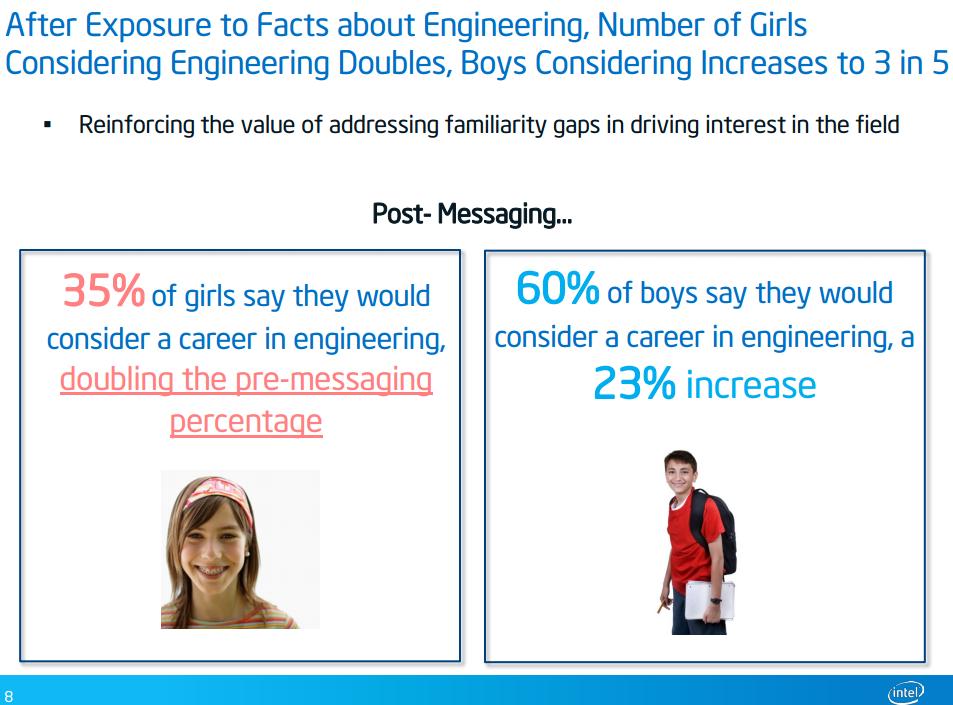I am happy to be tackling once again the subject of getting girls into the STEM majors, this time in honor of Introduce A Girl To Engineering Day.
To better understand the problem about why so few women are going in engineering, Intel conducted a study among 1,004 teens to determine their perception of engineering. The study was “designed to determine teens’ perceptions of engineering as well as motivations and barriers for pursuing or not pursuing a career in engineering”. What they found is that lack of familiarity with the field was the main obstacle.
These were some the statistics they got:



Since you’ve already heard my point of view about Computer Science again and again and again and again, I thought we could celebrate this day with a few words from other people for a change! Following on the train of thought of the Intel study, I was curious to compare among different women in engineering how they were introduced to the field and what they do to pay it forward. I was lucky enough to round up a fantastic and impressive group of women: Wendy Hawkins, the executive director of the Intel Foundation, Erin Wakefield, a senior component design engineer and engineering manager at Intel, and Erin Stropus, a senior systems test engineer and former classmate of mine.

WENDY HAWKINS, executive director of the Intel Foundation.
Can you tell our readers a little bit about what you do as the executive director of the Intel Foundation?
One of the things I love about my work is that each day is different from the next. Some days I am focused on designing and developing programs that help advance our objectives around advancing education globally. Other days I am meeting with other philanthropists to figure out ways we can work together more effectively. I do a lot of public speaking on education and philanthropy here in the U.S. and elsewhere. Many days I am working with Intel people all around the world to support their efforts to bring about education improvements in their countries.
What is your favorite part of your job?
I get up every day and go to work knowing that what I do has value beyond the paycheck I earn. That is a gift I treasure. I try to deserve it.
Which of your events do you consider to be the most successful in terms of impact? How does the Intel Foundation quantify success?
Oh my – you are making me choose my favorite child?? I love them all, but the Intel International Science & Engineering Fair has impact and ripple effects that reach many millions of students all around the globe. We know that well above 7 million students participate in science fairs directly tied to this program. We know from research – and from direct experience – that students who get the chance to do real science and engineering, who don’t just learn about the subjects, will carry that experience with them throughout their lives. Many of them actually become scientists and engineers – which is our greatest hope. But, the experience enriches the lives of those who go on to careers in other fields, as well. They learn to think critically, to solve problems, to understand the world around them, and to make good decisions about their lives and health and citizenship, all by drawing on what they have learned. Science and engineering are empowering and exciting fields. Memorizing facts and formulas simply cannot ignite that spark the way rolling up your sleeves and getting your hands dirty – performing experiments, building things, and learning something that no one else in the world knows, because you are the first person to find it – now that is exhilarating.
From your experience, what kind of questions do teens have about engineering?
Unless they are lucky enough to have an engineer in their family, most teens know almost nothing about the field. For starters, in today’s economic climate, teens are pretty amazed by what engineers earn and the data about engineers getting and keeping good jobs. But, I think more than anything, teens are fascinated to learn of how many different ‘flavors’ of engineers there are – the kinds of problems engineers get to solve, the arenas in which they are instrumental to making the world a better place. They cover just about any subject a teen could imagine. Who makes it possible for the rock star to rock? The engineer who designed their lighting and sound equipment. Who is creating the prosthetic devices that allow injured veterans to go on to live full and active lives? Who figures out how to get safe drinking water to people in drought-ravaged regions? Who is designing robotic cars that drive themselves? The whizziest new computing technologies? You name it, and an engineer is making it possible. When teens have the chance to see what engineers actually do, they perk up and get really interested!
Is there a specific message you try to get across to teens about engineering? Specifically to girls?
Engineers change the world. They solve real problems. They improve lives. And, they live good lives themselves. The best way to make sure that engineers pay attention to the problems that girls think are important, is for girls to get in there and become engineers themselves!
When I read in the news about events like the Intel Science Talent Search, I feel like the winners (and most of the participants) are extraordinary kids that “the rest of us” can’t hold a candle to. Is there a push to also introduce the average student to engineering?
Absolutely. The competitions certainly highlight some pretty amazing young people, but there is plenty of work for the rest of us, too. We work with schools across the U.S. and around the world to encourage opportunities for hands-on learning in engineering and science among every student. Robotics programs give all kids a chance to design, build and operate robots. The “Engineering is Elementary” project gives elementary students a taste of what engineering is. Our employees volunteer in schools all over the world to teach about engineering, computers, programming and related subjects. We advocate for high quality science and engineering education locally and nationally. Something relatively new on the scene are ‘maker fairs’ and other in- and out-of-school opportunities for both kids and adults to use tools and actually design and build things, to get a taste of what it means to be an engineer. There is room in the field for students with a wide range of abilities and interests.
As a software engineer and the mother of a toddler, I don’t currently have many opportunities to interact with teenagers. What can I do to participate in Engineers Week and Introduce A Girl To Engineering Day?
Contact your local high school and offer to come visit their classes to talk about your experience as an engineer. What do you love about the field? How did you prepare for your career? What is your life like beyond work? (Do you earn a good living? Can you balance work and family life? Can you teach a hands-on lesson to give the students a taste of what an engineer does?) The National Engineers Week coordinators in your area can help with support materials and often with scheduling to help match you to a school or classroom that will welcome a visit.
I sometimes get questions from non-technical parents about how they can help foster their child’s interest and education in STEM beyond their own level of knowledge. Do you have any suggestions for them?
Robotics clubs and maker fairs are a great introduction to the field for kids as young as elementary school. Books and television shows that showcase the fields of engineering and science can inspire. Science museums often offer classes and camps that encourage and teach. Friends and family who work in the field can be a great resource – have your child interview an engineer, shadow them for a day or ask an engineer to advise and mentor them as they prepare a project to enter in their local (Intel ISEF-affiliated!) science and engineering fair.

ERIN WAKEFIELD, senior component design engineer and engineering manager at Intel.
How were you introduced to engineering?
Throughout high school, I was pretty good at a variety of things but not really good at any one thing. I could have gone in a number of different directions, but there were two main reasons I ended up in computer engineering.
The first reason is that my dad is a computer scientist. Not only is he a computer scientist, but he’s also a big techie and gadget dork.
The second reason is my cousin Stacy – a mechanical engineer who also graduated from the University of Michigan. Growing up, I loved seeing what a strong career woman Stacy was, how she worked at really cool places, traveled all over, and had such a glamorous, corporate life.
Putting my two role models together I ended up with Computer Engineering as my major and have never regretted that decision.
When did you know you wanted to go into engineering?
AOL first became popular while I was in middle school, and my dad was one of the first people I knew to get an account (with a LOT of hours), thus providing me nearly unlimited access to the internet at an early age. In all the hours I spent playing on his computer (when I wasn’t fighting my siblings for the computer or phone line), I loved how intuitive it was to me and how easy it was for me to figure out how to do things and use applications I’d never received any instruction on. I felt if it was that easy for me, I must be good at it.
What college path did you take and why?
University of Michigan, B.S. in Computer Engineering, 2001-2005
Portland State University, Masters in Engineering and Technology Management, 2008-2010
Right after graduating from undergrad at the University of Michigan, I started working at Intel in Hillsboro, Oregon. In 2008, while still working at Intel, I went to Portland State University to get my masters. I was approved for two different masters degrees (engineering management and a technical engineering degree) but decided to only do the management degree in the interest of time. Intel is extremely supportive of continuing education. Intel understands that its engineers need to keep learning throughout their career to stay sharp.
What do you do now?
I’ve been fortunate enough to work on a number of different Intel products spanning multiple market segments, but all in the field of hardware validation. When I first began at Intel, I worked on post-silicon validation of mainstream CPU and server products.
After working on the CPU and servers team for about two and half years, I wanted to try my hand at something new and moved into a newly formed “start-up” team at Intel – working on pre-silicon validation of an IA based programmable discrete graphics card. During my three years of working on this team I moved first into a technical lead role and then into my first management role, managing a team that grew from three to 17 employees spanning two different Intel sites.
Currently, I work at Intel in Chandler, Arizona (moved from Oregon in November of 2010). I work in validation for a System-on-a-Chip (SOC) product used in consumer electronics, where I manage a team that owns pre- and post-silicon validation of security and codecs for consumer electronics and tablets.
What is your favorite part of your job?
The best part of my job is that it changes every day. There are always exciting new challenges and opportunities, and I never get bored. I also enjoy the fact that I work with some of the smartest people on the planet, and I am constantly learning and growing in my role.
Have you participated in events promoting engineering to teens?
Yes! I am currently the secretary of the Phoenix section of the Society of Women Engineers (SWE), and have been an active member holding various officer roles since my freshman year of college. One of SWE’s largest initiatives is outreach, and we’re constantly initiating and volunteering for activities to promote and educate K-12 students on STEM careers and opportunities. The SWE sections I’ve worked with have done everything from working with Girl Scout troops on engineering badges to inviting high school students to college campuses to shadowing engineering students throughout their day.
Did you consider the events to be a success?
The STEM outreach events I’ve been involved in have been a HUGE success. Students really seem engaged and excited by the engineering activities we do with them. I think the students also appreciate interacting with an organization like SWE – since it’s a great opportunity to meet strong female mentors in a variety of different engineering fields.
What kind of questions have teens asked you about engineering?
Some of the more common questions I get from teens about engineering are related to the impact of what I do and how engineering benefits society in general. They also often ask about the coolness factor, including details of the technology I work on and what kind of perks and pay I earn as an engineer.
Is there a specific message you try to get across to teens about engineering? Specifically to girls?
I think a lot of young woman in tech fall victim to confidence issues – especially when comparing themselves to their peers. As a result, one of my biggest pieces of advice to young women in tech is to stick with it, not be discouraged, and keep in mind that they’re a lot smarter and more capable than they tend to give themselves credit for. Women bring unique skill sets, perspectives, and opinions into the tech industry – and this diversity is CRITICAL to the success of any organization. Yes – women may have different experiences and knowledge than their male peers, but that’s what makes them so valuable!
Also, I would advise young women to not be afraid to ask questions, especially when starting a new role. Inquisitiveness is good, and since you only get busier as you move through your career, it’s important to take advantage of every opportunity to learn and grow.
Will you be celebrating Introduce A Girl to Engineering Day this year, how?
Both Intel and the Phoenix section of the Society of Women Engineers (SWE) are actively participating in Engineer Week (E-Week) of which Introduce a Girl to Engineering Day is a part of. That being said, I’m not personally doing anything this year specifically for that day, but I do plan to actively engage our SWE section, including myself, in doing something for 2013.

ERIN STROPUS, Senior Systems Test Engineer
How were you introduced to engineering?
Classic “Engineering” I discovered in high school but the technology world in general was introduced to me by my parents when my dad brought a Commodore 64 home for us to use. Eventually it evolved into the classic desktop computer, which I used to self-teach myself.
When did you know you wanted to go into engineering?
I knew I liked engineering when I was first truly introduced to it in high school and took some more advanced classes. I liked to see what I could create via code in a program, which was quite a feat in of itself since our classroom computers were so terribly slow and not up to the task!
What college path did you take and why?
Computer Science was my major and I started out with a minor in German but ended up majoring in that as well. Both I had studied in my years at high school and enjoyed them. Spoken language is not too different in its basics than computer programming languages: they have syntax, rules, exceptions, and logic that must be followed in order for it to be properly understood. I believe the similarities are what helped me excel in both. As for schooling, I knew I would go straight to a four-year university as my parents had always pushed that goal since I was a child and was an excellent student. In the near future, I may find a time in my busy life to work on grad school – I have looked into both a Masters in Business or Computer Science.
What do you do now?
Straight out of college I was hired at a local branch of a company with locations worldwide and works closely with the government and military as a defense contractor. I currently hold the title of Senior Systems Test Engineer where I am involved in the design, development, and testing of our software products.
Have you participated in events promoting engineering to teens?
For the last six years I have worked for my company, I have helped out during Engineering Week when we invite local high school students to attend to learn about engineering, our jobs, and to hear about real life experiences. I also spoke at an event for local high school girls through MESA (Math Engineering Science Achievement) that was held at Cal State University Channel Islands. Other programs I have had the great opportunity to take part in were career speeches at the schools and Johns Hopkins University Engineering Innovation program for students from disadvantaged backgrounds.
Did you consider the events to be a success?
I do consider the events to be a great help for the kids because I am not much older than they are and they can see how they can attain their goals in the very near future if they apply themselves to their education. I have received many letters of thanks, too, from attendees who say that they have appreciated my specific insights that I have given to them.
What kind of questions have teens asked you about engineering?
The first questions of engineering I have been asked about by students were the types of classes I had to take in school to get my specific job and what my salary is. 🙂 Usually though the specific questions are what types of programming languages used in my workplace, how I get along with my coworkers, and what I hate/enjoy the most about my job.
Is there a specific message you try to get across to teens about engineering?
My points I try to drive home to the kids is that they should work hard on their education and dabble into internships and jobs while taking classes so that they can have experience once they graduate college. I point out that sometimes one may not get the dream job he/she has always wanted but with hard work and dedication, their sacrifices will pay off in the long run.
Will you be celebrating Introduce A Girl to Engineering Day this year, how?
I will be celebrating Introduce a Girl to Engineering Day this year and my workplace has posted information and posters on getting involved. Sadly, this year I will not be able to help out in the event for Engineering Week with the visiting high school students due to a project requiring my full attention and presence.
I am so inspired by these women. They are busy gals no doubt, yet they make time to promote engineering. Not because they get something out of it, not because they have to do it. They are just truly devoted to actively participating in the engineer community and helping youth find their path. Intel’s study delivers a short and powerful message: knowledge is power. For this Introduce A Girl To Engineer Day and Engineers Week, why don’t you help others by paying it forward?
To find a local event, please review the schedule or find a way to get involved!



How can you address this topic without a link to Peggy Seeger’s “Gonna Be An Engineer” song??
Here is a great fan video of it: http://www.youtube.com/watch?v=qr8jFMXTioc
While I’m totally up for introducing girls to engineering, it’s not just about the girls. Boys also should have opportunities to see women working in engineering and other STEM roles. We need to change the perceptions of everyone, not just females.
Hi Meta,
I agree on your comments. As I pointed out to Ariane above in the interview, I’ve done several events that cater to all students – only one of them was geared primarily towards girls. Both the young guys and girls I have had the opportunity to meet have been very responsive and ambitious to seeing someone within their generational age range. From what I have seen, I think we have a very bright future with our youth in STEM. Such career paths are being recognized as more “mainstream” these days than they used to be as more kids have computers in their homes and are introducing themselves to the basics, making the stigma of being savvy in such things not as terrible as it once was.
Great article, but I have one question: When is “Introduce A Girl To Engineering Day”?
My daughter wants to grow up and be a Disney Imagineer. With this goal in mind, she is acing her Math, Science and Tech (intro to enginnering) classes in Middle School. 🙂
Sorry if I didn’t make it clear, it was the day the article ran (Feb 23rd).
Good for your daughter to have big goal at such a young age! Especially if it helps motivate her in school. You can also look around for kids programs in robotics and such, like FIRST, to encourage her to participate in these topics outside of school too. I don’t have any experience with these programs myself, but I hear a lot of good things. I recently read a statistics that 9% of incoming MIT students were in the FIRST program, not too shabby!
Good luck!
I missed the actual date, but I’m taking my daughter and my teenager mentee to an event called STEMfest this weekend at an interactive learning center called The Works in Newark, Ohio.